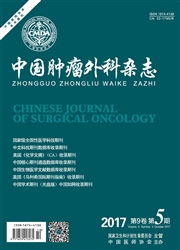

 中文摘要:
中文摘要:
目的:探索中年肺癌患者临床特点并进行预后分析。方法回顾性分析2009年1月至2011年12月术后病理证实的126例中年肺癌患者的临床病理资料,采用Kaplan-Meier法和Cox回归进行中年肺癌患者预后的单因素及多因素生分析。结果126例中年肺癌患者5年无病生存率( FDS)和总体生存率( OS)分别为40.4%和45.2%。单因素分析发现患者的肿瘤复发与淋巴转移(P=0.002)、病理类型(P=0.031)和TNM分期(P<0.001)有关;而多因素分析提示TNM分期为影响中年肺癌患者肿瘤复发的独立危险因子,并随着TNM分期的增高相对危险度增加( HR:I期0.148 vs.II期0.227 vs.IIIA期0.421 vs.IIIB/IV期1)。同时单因素分析发现淋巴转移(P=0.007)、胸膜转移(P=0.001)和TNM分期(P<0.001)与患者生存有关;多因素分析提示胸膜转移(P=0.007)和TNM分期(P<0.001)为影响中年肺癌患者生存的独立危险因子。结论 TNM分期和胸膜侵犯与中年肺癌患者预后相关,并且TNM分期是影响中年肺癌患者预后的独立危险因子。
 英文摘要:
英文摘要:
Objective To explore the clinical features and prognostic factors of middle-aged patients with lung cancer. Methods The clinicopathological data of 126 middle-aged patients with lung cancer was retrospectively analyzed by using univariate ( Log-rank) and multivariate ( Cox model) methods.Results 5-year disease-free survival ( FDS) and over-all survival (OS) in 126 cases of middle-aged patients with lung cancer was 40.4%and 45.2%respectively.Malignancy recurrence was related with lymph node metastasis (P=0.002), histological type (P=0.031) and TNM stage (P〈0.001) using Kaplan Meier survival analysis.However, only TNM stage was an independent risk factor affecting relapse, and the higher TNM grade the more increased relative risk.Simultaneously overall survival was associated with lymph node metastasis (P=0.007), pleural metastasis (P=0.001) and TNM stage (P〈0.001).Moreover, pleural metastasis and TNM stage were independent risk factors affecting survival of middle-aged patients with lung cancer.Conclusion TNM staging and pleural invasion are associated with prognosis of the middle-aged patients with lung cancer.TNM staging is an independent risk factor affecting the prognosis of middle-aged patients with lung cancer.
 同期刊论文项目
同期刊论文项目
 同项目期刊论文
同项目期刊论文
 期刊信息
期刊信息
